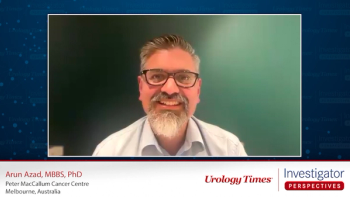Rethinking Comparisons: Novel Strategies for Evaluating Androgen Receptor Inhibitors in Prostate Cancer

A panelist discusses how MAIC (Matching-Adjusted Indirect Comparison) methodology addresses the lack of head-to-head clinical trials in metastatic hormone-sensitive prostate cancer (mHSPC) by adjusting for differences in patient characteristics across separate studies to enable more reliable indirect treatment comparisons.

A panelist discusses how Matching-Adjusted Indirect Comparison (MAIC) analyses are limited by potential unmeasured confounding factors, small effective sample sizes after matching, and reliance on published aggregate data, which should be carefully considered when interpreting findings as complementary rather than definitive evidence for treatment decisions.

A panelist discusses how the ARCHES and ARANOTE trials differ in their fundamental design elements, with ARCHES evaluating enzalutamide plus androgen deprivation therapy (ADT) vs placebo plus ADT in both metastatic and nonmetastatic patients, whereas ARANOTE specifically studied darolutamide and ADT vs ADT alone in patients with newly diagnosed metastatic hormone-sensitive prostate cancer.

A panelist discusses how both the ARCHES and ARANOTE trials demonstrated significant improvements in radiographic progression-free survival with their respective novel hormonal therapies (enzalutamide in ARCHES and apalutamide in ARANOTE) when added to androgen deprivation therapy (ADT) for metastatic hormone-sensitive prostate cancer, with consistent benefits observed across key subgroups and generally manageable safety profiles.

A panelist discusses how enzalutamide and darolutamide differ in their molecular structures and pharmacokinetic profiles, with darolutamide showing lower blood-brain barrier penetration, which potentially contributes to its reduced central nervous system adverse effects compared with enzalutamide.

A panelist discusses how clinicians should weigh the decision between enzalutamide and darolutamide for patients with metastatic hormone-sensitive prostate cancer (mHSPC) by considering each drug’s efficacy profile alongside their distinct adverse effect patterns, particularly darolutamide’s favorable central nervous system (CNS) toxicity profile vs enzalutamide’s more established long-term data, while also factoring in individual patient characteristics such as age, comorbidities, and potential drug interactions.

A panelist discusses how the findings in the docetaxel-naive population show distinct differences in treatment efficacy, with potentially greater benefits observed for certain androgen receptor pathway inhibitors, which suggests clinicians should consider these differential outcomes when sequencing therapies for patients with metastatic hormone-sensitive prostate cancer (mHSPC) who have not previously received chemotherapy.

A panelist discusses how these comparative results could influence clinical decision-making by suggesting potentially different magnitudes of benefit between enzalutamide and darolutamide depending on disease volume, with the treatment effect differences possibly being more pronounced in high-volume disease patients, although individual patient factors should still guide personalized therapy selection.

A panelist discusses how the outcomes of this study broadly align with real-world treatment patterns and clinical experiences, where enzalutamide and darolutamide both demonstrate efficacy in metastatic hormone-sensitive prostate cancer (mHSPC), although practical considerations such as darolutamide’s more favorable central nervous system (CNS) toxicity profile and enzalutamide’s longer clinical experience often influence prescribing decisions based on individual patient characteristics and comorbidities

A panelist discusses how they would communicate these comparative study results to patients by explaining that both enzalutamide and darolutamide effectively control metastatic prostate cancer when added to hormone therapy while emphasizing that darolutamide may cause fewer central nervous system adverse effects like fatigue and cognitive changes, helping patients understand the potential benefits and tradeoffs to make a treatment decision that best fits their individual situation and preferences.

